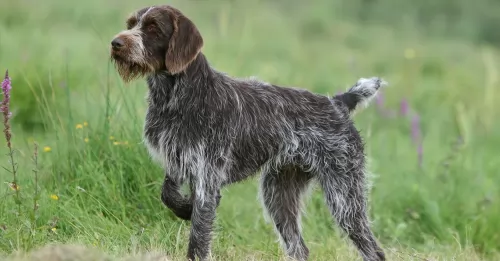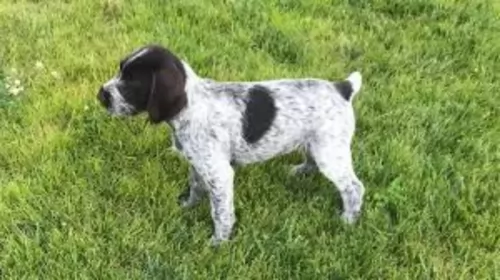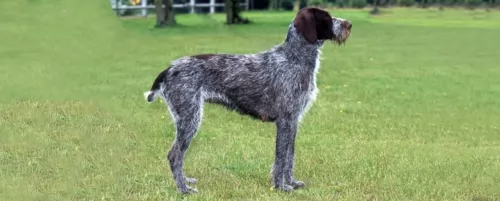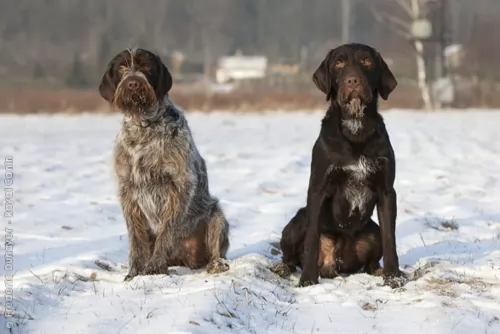 Petzlover
Petzlover Cesky Fousek is originated from Czech Republic but Magyar Agar is originated from Hungary. Both Cesky Fousek and Magyar Agar are having almost same height. Both Cesky Fousek and Magyar Agar are having almost same weight. Both Cesky Fousek and Magyar Agar has almost same life span. Cesky Fousek may have less litter size than Magyar Agar. Both Cesky Fousek and Magyar Agar requires Low Maintenance.
Cesky Fousek is originated from Czech Republic but Magyar Agar is originated from Hungary. Both Cesky Fousek and Magyar Agar are having almost same height. Both Cesky Fousek and Magyar Agar are having almost same weight. Both Cesky Fousek and Magyar Agar has almost same life span. Cesky Fousek may have less litter size than Magyar Agar. Both Cesky Fousek and Magyar Agar requires Low Maintenance.
 The Cesky Fousek is also known as the Bohemian Wire-Haired Pointing Griffon and he hails from the Czech Republic. The name ‘Fousek’ is referring to the dogs facial hair.
The Cesky Fousek is also known as the Bohemian Wire-Haired Pointing Griffon and he hails from the Czech Republic. The name ‘Fousek’ is referring to the dogs facial hair.
With World War 1, the dog all but disappeared, but with careful breeding, its numbers have built up. Today the dog is a popular hunting breed in its home country. In 1957 and 1958, Czechoslovakia joined the Federation Cynologique Internationale, and this is when a new breed standard was written and approved. In 1964, the dog breed was recognized by the FCI and by the United Kennel Club in 1996.
The Cesky Fousek has even been represented on postage stamps issued in the country in 1965, and again in 1973. Today, the breed is as popular as ever in the Czech Republic as well as other countries where there are breeding programs.
 The tall, slender Magyar Agar is a sighthound dog breed hailing from Hungary and which has been used for hunting and coursing, some dogs of which are still used for this purpose today.
The tall, slender Magyar Agar is a sighthound dog breed hailing from Hungary and which has been used for hunting and coursing, some dogs of which are still used for this purpose today.
Those who know the dog breed well will tell you that the dog isn’t the 'Hungarian greyhound', being a distinct breed with its own characteristics and breed designation.
They certainly go back centuries, and in fact, records tell us that they arrived in northeastern Hungary more than a thousand years ago.
 The Cesky Fousek is a medium sized dog with both the male and the female standing between 58 – 66cm and weighing 22–28kg. The dog has a fairly distinctive appearance, looking quite a bit like a German Wire-haired Pointer, but he has the mustache and beard which the Pointer doesn’t have.
The Cesky Fousek is a medium sized dog with both the male and the female standing between 58 – 66cm and weighing 22–28kg. The dog has a fairly distinctive appearance, looking quite a bit like a German Wire-haired Pointer, but he has the mustache and beard which the Pointer doesn’t have.
The tail of this dog is carried horizontally and is generally docked to 3/5 of its natural length to give the dog a distinctive look. These days, with regulations around docking, the tail is left long. The ears are floppy and rounded at the tips and the eyes are brown.
The dog’s coat is short to medium length and fairly coarse with colors being dark roan or brown with ticked markings.
The Cesky Fousek is an energetic, eager-to-please dog and he just loves playing with the children in the home. He is an intelligent dog who is loyal, social and protective and you’ll find that he is easy to train. In fact, with socialization and training, he becomes obedient and amicable around adults, children and other pets.
 Described as a large dog resembling a Greyhound and being more longer in body than being tall they are more heavily boned than the fine-boned Greyhound.
Described as a large dog resembling a Greyhound and being more longer in body than being tall they are more heavily boned than the fine-boned Greyhound.
The Magyar is a large dog standing at between 62 – 70cm in height and weighing between 22 and 31kg. If you want your Magyar to have puppies, these dogs can produce between 6 to 10. The dogs have a smooth dense coat and the coat can be any color, but not black and tan or tri-color.
The ears of the dog are short to medium and are semi-erect, semi-floppy and most times held back. The tail of the dog is long.
These are hardy dogs, and even with their short coats they are able to cope with lower temperatures. They are quiet and docile and are loving towards their human family. They also have a strong instinct to guard their owners.
They are amicable dogs, getting on well with children and pets in the home.As with most dogs, he can benefit from training and socialization. He is an adaptable dog too and will settle into life in the city or the countryside, but wherever he lives, he will need to be exercised well.
They love cozying up to their owners on the couch and thoroughly relaxing, but they also love being out and about too. A walk in the countryside or the park is a a chance to be let off the leash for some running.
 The Cesky Fousek is a fun loving, good natured dog who is always up for a game. This is why he isn’t a dog that will fit into an apartment or shoe-box size garden.
The Cesky Fousek is a fun loving, good natured dog who is always up for a game. This is why he isn’t a dog that will fit into an apartment or shoe-box size garden.
Socialize and train him and he becomes a wonderful family pet, good around children and other pets. He loves human companionship and isn’t a dog to be left outside to run around on his own.
The Cesky Fousek is easy to train, and when he is treated properly and made to feel an important member of the family, he provides you with his unconditional love and friendship.
 The Magyar Agar may well have been developed for hunting, but today he makes a splendid pet.
The Magyar Agar may well have been developed for hunting, but today he makes a splendid pet.
He is intelligent and quiet, as well as being loyal. While he loves being outside playing or going on walks, he is quite happy to curl up on the couch with you – the nearness to you is what he loves.
Beautiful and loving, this dog symbolizes the best qualities that man wants in a canine friend.
 The average lifespan of this dog breed is about 12 to 15 years, and even though he is a robust breed, some common health issues do exist.
The average lifespan of this dog breed is about 12 to 15 years, and even though he is a robust breed, some common health issues do exist.
Certainly if you’re considering breeding for your Cesky Fousek, you’ll want to have him tested for dysplasia, eye problems and Von Willebrands Disease.
Von Willebrands Disease is an inherited bleeding disorder, caused by a deficiency in the amount of a specific protein needed to help platelets.Often the dog doesn’t show outward evidence of having the disease while other dogs might even hemorrhage from the nose or elsewhere.
 The Magyar Agár is looked upon as a healthy dog breed, and with good care can live to be 12 to 14 years of age. With this dog you want to be on the lookout for some of the common dog illnesses he could succumb to -
The Magyar Agár is looked upon as a healthy dog breed, and with good care can live to be 12 to 14 years of age. With this dog you want to be on the lookout for some of the common dog illnesses he could succumb to -
This is a fairly common problem in dogs. The thyroid gland produces the hormone thyroxine with other thyroid hormones. Playing a role in the dog’s metabolism, when the thyroid is out of sync it can cause problems for your dog.
Hypothyroidism happens when your dog doesn’t secrete enough of the thyroid hormones, slowing the dog’s metabolism. Some of the symptoms include obesity, lethargy, coat thinning and cold intolerance.
This is an inherited disease of the retina, occurring in both eyes together. Thankfully it isn't painful for the dog. There are different types of inherited retinal degenerative diseases in dogs and the first signs of this are seeing your dog with night-blindness and the pupils being dilated. There is no cure, but specific antioxidant supplementation does help support the retinal health of the dog and can actually help to prevent vision loss.
Itching outbreaks from a skin allergy can make your pet miserable with constant licking and biting. Whether these allergies are inhaled, food related or from flea bites, they can cause your pet great discomfort. The fur or coat may even have started to fall out in patches. Allergies like this can occur when the dog's immune system is weakened. Feeding your dog some raw meat, getting him to the vet and providing excellent grooming can help with your pet’s skin problems.
 The coat of the Cesky Fousek is easy to maintain and you’ll want to brush him at least twice a week with a firm bristle brush to get through the coarse hair and rid him of loose hairs.
The coat of the Cesky Fousek is easy to maintain and you’ll want to brush him at least twice a week with a firm bristle brush to get through the coarse hair and rid him of loose hairs.
Ear infections are common in dogs, but dogs with floppy ears are more susceptible to ear infections than dogs with erect ears. The infection often starts in the external ear canal and occurs when excess bacteria grows in the ear canal and it becomes inflamed.
Always take your pet to the veterinarian at the first sign of an ear infection. You’ll notice your pet shaking his head and the ear may well be red and inflamed. Your vet will discuss the proper treatment and suggest ways to prevent recurrence. The vet may also recommend an ear cleaning solution as well.
This dog breed needs plenty of exercise and he’ll love his daily walks with you. Put him on a leash and allow him to run with you when you go cycling or jogging.
This is a very active dog used to hunting and he’ll require good quality protein. Speak to your vet about how many calories your dog will need each day, more so if you have a puppy and are unsure in terms of his growth.
He is a medium-to-large breed so you’ll want a food that caters for his size, his age and his energy. Include portions of rice, vegetable and meat into his kibble from time to time for variety, and never forget to include some raw meat into his diet.
Fresh, cool water is of critical importance and should be available night and day.
 Make sure you take wonderful care of your Magyar Agar. It is a social, living creature who needs to be loved and cherished.
Make sure you take wonderful care of your Magyar Agar. It is a social, living creature who needs to be loved and cherished.
Provide him with the best food there is. If you invest in dry kibble, try and add in cooked chicken, brown rice and raw or cooked vegetables from time to time as well as some raw meat. Keep the diet simple to avoid digestive upsets.